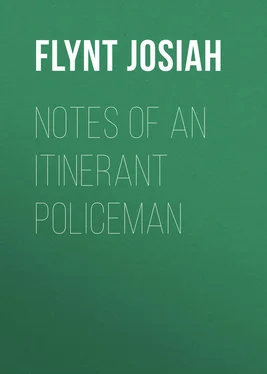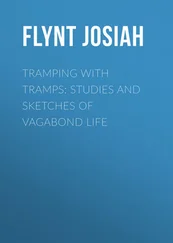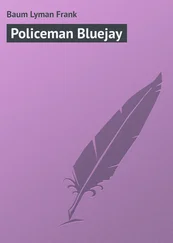Josiah Flynt - Notes of an Itinerant Policeman
Здесь есть возможность читать онлайн «Josiah Flynt - Notes of an Itinerant Policeman» — ознакомительный отрывок электронной книги совершенно бесплатно, а после прочтения отрывка купить полную версию. В некоторых случаях можно слушать аудио, скачать через торрент в формате fb2 и присутствует краткое содержание. Жанр: foreign_antique, foreign_prose, на английском языке. Описание произведения, (предисловие) а так же отзывы посетителей доступны на портале библиотеки ЛибКат.
- Название:Notes of an Itinerant Policeman
- Автор:
- Жанр:
- Год:неизвестен
- ISBN:нет данных
- Рейтинг книги:4 / 5. Голосов: 1
-
Избранное:Добавить в избранное
- Отзывы:
-
Ваша оценка:
- 80
- 1
- 2
- 3
- 4
- 5
Notes of an Itinerant Policeman: краткое содержание, описание и аннотация
Предлагаем к чтению аннотацию, описание, краткое содержание или предисловие (зависит от того, что написал сам автор книги «Notes of an Itinerant Policeman»). Если вы не нашли необходимую информацию о книге — напишите в комментариях, мы постараемся отыскать её.
Notes of an Itinerant Policeman — читать онлайн ознакомительный отрывок
Ниже представлен текст книги, разбитый по страницам. Система сохранения места последней прочитанной страницы, позволяет с удобством читать онлайн бесплатно книгу «Notes of an Itinerant Policeman», без необходимости каждый раз заново искать на чём Вы остановились. Поставьте закладку, и сможете в любой момент перейти на страницу, на которой закончили чтение.
Интервал:
Закладка:
Respectable, law-abiding people never realise what a comfort this caste feeling is to thousands of men. I have met even educated men to whom it has been a consolation. They have never been able to define exactly the compensation it affords them, indeed they have often been ashamed to admit the fact, but it has remained, nevertheless. I think the man I have just quoted enunciates it as clearly as it is possible to be set forth in words. His joy consisted in discovering that he was just as "smart," just as full of resource, just as equal to a trying situation, even in his disgrace and downfall, as the man who shunned his company, who wanted him banished or sent to prison; he had revenged himself, so to speak, on his avengers, a gratification which is more or less dear to all human beings.
Personal liberty and freedom in contra-distinction to class liberty and freedom also count for a good deal in the outcast's life. Besides being independent of other people, he is also more or less independent of his own people, so far as laws and commands are concerned. He tolerates no king, president, or parliament, and resents with vigour any infringements upon his privileges, either from society or his own organisation. In fact, he leaves the organisation and lives by himself alone, if he feels that its unwritten, but at times rather strict, laws bear too heavily upon him. There are men who live absolutely apart from the crowd, shunning all society, except that which supports them. They are often called "cranks" by their less thoroughgoing companions, and would probably impress every one as a little crotchety and peculiar, but their action is the logical outcome of the life. The tendency of this life is to make a man dislike the slightest conventionalism, and to live up to his disliking is the consistent conduct of every man in it. He hates veneer about him in every particular and only as he throws off every vestige of it does he enjoy to the full his world.
In a lodging-house in Chicago, some years ago, I met a tramp who was a good example of the liberty-loving professional offenders. We awoke in the morning a little earlier than the rest, and, as it was not yet time to get up, fell to talking and "declaring ourselves," as tramps do under such circumstances. After we had exchanged the usual cut and dried remarks which even hobo society cannot do entirely without, he said to me, suddenly, and utterly without connection with what had gone before: "Don't you love this sort o' life?" at the same time looking at me enthusiastically, almost as if inspired. I confessed that it had certain attractive features, and showed, for the sake of drawing him out, an enthusiasm of my own. "I don't see," he went on, "how I have ever lived differently. I was brought up on a farm, but, my goodness, I wouldn't trade this life if you'd give me all the land in the wild West. Why, I can do just as I please now – exactly. When I want to go anywhere, I get on a train and go, and no one has the right to ask me any questions. That's what I call liberty, – I want to go just where I please," and he brought out the words with an emphasis that could not have been stronger had he been stating his religious convictions.
I have often been asked whether tramps and criminals have class divisions and distinctions like those in society proper. "Are there aristocrats and middle class people, for instance," a number of persons have said to me, "and does position count for much?" Most certainly there are these distinctions, and they constitute one of the most notable features of the life. There is just as much chance to climb high and fall low, in the outcast world, there are just as many prizes and praises to win, as in the larger world surrounding it, and the investigator will find, if he observes carefully enough, the identical little jealousies, criticisms, and quarrels that prevail in "polite society."
A man acquires position in pretty much the same way that it is acquired elsewhere, – he either works hard for it, or it is granted him by common consent on account of his superior native endowment. There is as little jumping into fame in this world as in any other; one must prove his ability to do certain things well, have a record of preparation consistent with his achievements, before he can take any very high place in the social order. The criminal enjoys, as a rule, the highest position; he is the aristocrat of the entire community. Everybody looks up to him, his presence is desired at "hang-out" gatherings, boys delight to shake his hand, and men repeat his remarks like the wise sayings of a prophet. He feels his importance, works for it, and tries to live up to it, just as determinedly as aristocrats in other spheres of activity, and if he loses it and falls from grace, the disappointment is correspondingly keen.
The tramp may be said to belong to the middle class of the outcast world, and, like other middle class people, he often finds life a little nicer in a class socially above him. He enjoys associating with criminals, being able to quote them on matters of interest to the "hang-out," and giving the impression that he is au courant with their business. If he can do all this well it makes him so much the more important among his fellows. His own particular class, however, also has advantages and attractions, and there are men who seek his company nearly as much as he seeks the criminals. There is an upper middle class as well as a lower, and the line of separation is sharply drawn. The "old stagers," the men who have been years "on the road," and know it "down to the ground," as they say, constitute the upper middle class. They can dictate somewhat to the tramps not so experienced as they are, and their opinions are always listened to first. If they say, for instance, that a certain town is "hostile," unfriendly to beggars, the statement is accepted on its face, unless some one has absolute evidence to the contrary, and even then the under class man makes his demurrer very modestly. I have never succeeded in getting as far as this during my tramp experiences, and had to remain content in the lower division, but even there I had a significance denied to men less experienced than I was. A newcomer, for instance, a "tenderfoot," was expected to show me deference, and if I happened in at a "hang-out," where only newcomers were present, I was cock of the walk. Even these "tenderfeet" have a class pride, too, for at the bottom of all this social arrangement there are men and women who have been turned out of every class, the outcast of the outcasts. They are called "tomato-can-stiffs" and "barrel dossers" by the people above them, terms which indicate that they have reached the last pitch of degradation. They realise their disgrace nearly as much as their counterparts who have been turned out of respectable society, and often look with longing upon the positions they once enjoyed, but their lot is not entirely without its consolations, as I learned one day in talking with one of them. "Well, at any rate," he said, "I ain't got to keep thinkin' all the while 't I'm goin' to fall and lose my posish the way you have to. There's no place for me to fall to, I've come to the end o' my rope. You've got to keep lookin' out fer yerself ev'ry step you take – keep worryin' about gettin' on, 'n' I don't have them worries any more, 'n' it's a big relief, I tell you. You feel the way you do when you get out o' prison." This thought is a little fanciful, and not entirely sincere, but I can nevertheless appreciate the man's point of view, for, with all the independence and liberty of this world, there is, just as he said, considerable worry about holding one's place, and I can imagine a time when it would be pleasant to be relieved of it all.
The financial profits in a professional offender's career are not easy to determine, but they must be taken into consideration in all accounts of his life, no matter how short. I saw more of the pickpocket, during my police experience, than of any other professional thief, and it was possible for me to learn considerable in regard to his winnings.
Читать дальшеИнтервал:
Закладка:
Похожие книги на «Notes of an Itinerant Policeman»
Представляем Вашему вниманию похожие книги на «Notes of an Itinerant Policeman» списком для выбора. Мы отобрали схожую по названию и смыслу литературу в надежде предоставить читателям больше вариантов отыскать новые, интересные, ещё непрочитанные произведения.
Обсуждение, отзывы о книге «Notes of an Itinerant Policeman» и просто собственные мнения читателей. Оставьте ваши комментарии, напишите, что Вы думаете о произведении, его смысле или главных героях. Укажите что конкретно понравилось, а что нет, и почему Вы так считаете.












